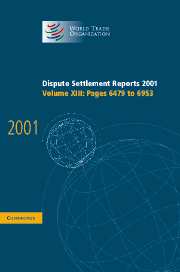Book contents
- Frontmatter
- Contents
- United States - Import Prohibition of Certain Shrimp and Shrimp Products - Recourse to Article 21.5 of the DSU by Malaysia (WT/DS58): Report of the Appellate Body
- United States - Import Prohibition of Certain Shrimp and Shrimp Products - Recourse to Article 21.5 of the DSU by Malaysia (WT/DS58): Report of the Panel
- Mexico - Anti-Dumping Investigation of High Fructose Corn Syrup (HFCS) from the United States - Recourse to Article 21.5 of the DSU by the United States (WT/DS132): Report of the Appellate Body
- Mexico - Anti-Dumping Investigation of High Fructose Corn Syrup (HFCS) from the United States - Recourse to Article 21.5 of the DSU by the United States (WT/DS132): Report of the Panel
- Canada - Measures Affecting the Importation of Milk and the Exportation of Dairy Products - Recourse to Article 21.5 of the DSU by New Zealand and the United States (WT/DS103, WT/DS113): Report of the Appellate Body
- Canada - Measures Affecting the Importation of Milk and the Exportation of Dairy Products - Recourse to Article 21.5 of the DSU by New Zealand and the United States (WT/DS103, WT/DS113): Report of the Panel
United States - Import Prohibition of Certain Shrimp and Shrimp Products - Recourse to Article 21.5 of the DSU by Malaysia (WT/DS58): Report of the Appellate Body
Published online by Cambridge University Press: 13 December 2017
- Frontmatter
- Contents
- United States - Import Prohibition of Certain Shrimp and Shrimp Products - Recourse to Article 21.5 of the DSU by Malaysia (WT/DS58): Report of the Appellate Body
- United States - Import Prohibition of Certain Shrimp and Shrimp Products - Recourse to Article 21.5 of the DSU by Malaysia (WT/DS58): Report of the Panel
- Mexico - Anti-Dumping Investigation of High Fructose Corn Syrup (HFCS) from the United States - Recourse to Article 21.5 of the DSU by the United States (WT/DS132): Report of the Appellate Body
- Mexico - Anti-Dumping Investigation of High Fructose Corn Syrup (HFCS) from the United States - Recourse to Article 21.5 of the DSU by the United States (WT/DS132): Report of the Panel
- Canada - Measures Affecting the Importation of Milk and the Exportation of Dairy Products - Recourse to Article 21.5 of the DSU by New Zealand and the United States (WT/DS103, WT/DS113): Report of the Appellate Body
- Canada - Measures Affecting the Importation of Milk and the Exportation of Dairy Products - Recourse to Article 21.5 of the DSU by New Zealand and the United States (WT/DS103, WT/DS113): Report of the Panel
Summary
INTRODUCTION
Malaysia appeals from certain issues of law and legal interpretations in the Panel Report, United States - Import Prohibition of Certain Shrimp and Shrimp Products, Recourse to Article 21.5 of the DSU by Malaysia (the “Panel Report”). In accordance with Article 21.5 of the Understanding on Rules and Procedures Governing the Settlement of Disputes (the “DSU”), Malaysia requested that the Dispute Settlement Body (the “DSB”) refer to a panel its complaint with respect to whether the United States had complied with the recommendations and rulings of the DSB in United States - Import Prohibition of Certain Shrimp and Shrimp Products (“United States - Shrimp”).
The background to this dispute is set out in detail in the Panel Report. On 6 November 1998, the DSB adopted the reports of the original panel and the Appellate Body in United States - Shrimp. The DSB recommended that the United States bring its import prohibition into conformity with its obligations under the Marrakesh Agreement Establishing the World Trade Organization (the “WTO Agreement ”). On 6 December 1999, the period of time for implementation established by the parties under Article 21.3(b) of the DSU expired. At the DSB meeting of 23 October 2000, Malaysia informed the DSB that it was not satisfied that the United States had complied with the recommendations and rulings of the DSB, and announced that it wished to seek recourse to a panel under Article 21.5 of the DSU. The DSB referred the matter to the original panel.
Malaysia's complaint relates to a measure taken by the United States in the form of an import prohibition to protect and conserve certain species of sea turtles, considered to be an endangered species. This original measure, Section 609 of the United States Public Law 101-162 (“Section 609”), and its application are described in detail in the Appellate Body Report in United States - Shrimp. The Appellate Body found that Section 609 was provisionally justified under Article XX(g) of the General Agreement on Tariffs and Trade 1994 (the “GATT 1994”). In implementing the recommendations and rulings of the DSB, the United States did not amend Section 609, with the result that the import prohibition is still in effect.
- Type
- Chapter
- Information
- Dispute Settlement Reports 2001 , pp. 6481 - 6528Publisher: Cambridge University PressPrint publication year: 2004
- 12
- Cited by



